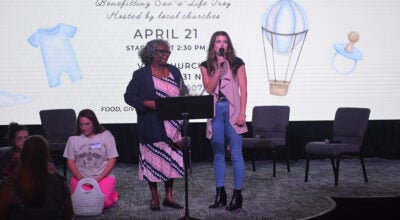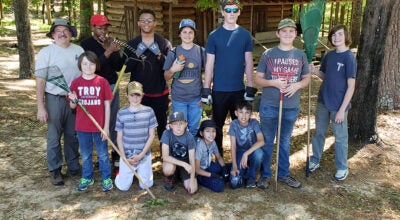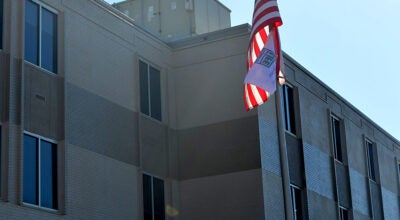The day that lives in infamy
Published 3:00 am Wednesday, December 7, 2016
Yesterday, December 7, 1941 – a date that will live in infamy – the United States of America was suddenly and deliberately attacked by naval and air forces of the Empire of Japan … I ask that the Congress declare that since the unprovoked and dastardly attack by Japan on Sunday, December 7, a state of war has existed between the United States and the Japanese Empire.
All across the United States, families crowded around their home radios to listen to President Franklin D. Roosevelt’s “Pearl Harbor Speech” on December 8, 1941.
At 7:55 a.m. on Sunday, December 7, 1941, the Japanese had launched an aerial attack on the U.S. Naval Base at Pearl Harbor. The attacked lasted 110 minutes and ended at 9:45 a.m. The attack came in two waves, about 45 minutes apart.
In the attack, 2,403 Americans were killed and 1,178 were wounded. Nearly half of those killed were aboard the USS Arizona, which was hit four times and sunk.
Charles Saunders and four friends were riding up East Park Avenue in a Ford coupe and heard on the car radio that Pearl Harbor had been bombed.
“We were young boys and didn’t pay too much attention to it,” Saunders said. “The next day, President Roosevelt spoke to Congress. That’s when it was brought home to us that it was serious. That’s when we realized that we were at war.”
Three of those young men in the Ford coupe with Saunders on December 7, 1941 were killed in World War II. Two were pilots and one was a paratrooper.
“War is serious business,” Saunders said.
“After Pearl Harbor was bombed boys and men lined up for blocks wanting to get into the military. When I graduated from Opp High School in 1943, every boy in my class went into the military.
“And, the home front was involved in the war effort. Most everything was rationed. Copper and aluminum were put out on the corner of the street and trucks would come along every two or three days to pick it up for scrap. Women went to work in aircraft factories and in shipyards. The efforts on the home front did a lot to win World War II.”
Jim O’Neal remembers that Sunday, December 7, 1941 when the news of the Japanese attack on Pearl Harbor came through the static of the radio.
“I was 16 years old, when we heard that the Japanese had attacked our naval base at Pearl Harbor,” O’Neal said. “We were surprised, shocked. The next day, my family crowded around the radio to listen to President Roosevelt address Congress. The mood was very somber. We were not looking forward to going to war but President Roosevelt’s address to Congress was firm and gave us confidence. We felt like the war would be over in about six months and we would be victorious. We were confident that America would be successful.”
O’Neal said all across the country people were upset – mad – about the sneak attack on the United States.
“That mood was reflected in the long lines at the recruiting stations all around the nation,” he said. “We were ready to jump in, win and get it over. I, like so many, was confident that we would be victorious in a few months so I wasn’t concerned about serving. But I was wrong.”
O’Neal graduated from Troy High School in 1943. Two weeks later, he was in the Army.
“All of the male members of our graduating class went into service,” he said. “We were in different branches of the military and we were scattered all over the country. We were all proud to serve. We wanted to do our part.”
Billy Jackson’s dad was driving him from out in the county back to Troy State Teachers College when the news came on the car radio that Pearl Harbor had been attacked by the Japanese.
“We were shocked, as if the world had suddenly stopped,” said Jackson, who was 16 years old at the time. “At the boarding house where I was staying, everybody was startled. We didn’t know what to say to each other. We were all alarmed. We didn’t know how that could have happened to us.
“On the college campus, the mood was quiet because we all knew that, if our country was at war, then we wanted to go. If you were 21, you were going.”
Jackson said fight was in most young men and many of them lied about their ages so they could go to the war.
Jackson experienced the early years of the war as a college student. He was a member of the Troy Wavemen and played for the dances that were attended by local young ladies and soldiers stationed at Fort Rucker.
“There was nothing going on the college campus because most of the male students were in the military,” he said. “All the classes were held downstairs at Bibb Graves. Many of the female students were upstairs learning to put radios together. So many things were rationed, from sugar to gas. Life was very different here at home.”
When Jackson turned 18, he went into the service.
“I had already been sworn into the Army Air Corps and in two months I qualified for pilot school,” he said. “I wanted to serve. It was my duty. That was the feeling of most young men.”
Otis Stone was only six years old, when Pearl Harbor was bombed. But even at such a young age, he realized that something had happened that made his daddy mad, hopping mad.
“He was mad and upset that the ‘Japs’ that’s what he called them, had the nerve to attack this country,” Stone said. “I was young, but I remember us gathering around the radio listening the newscaster, Gabriel Heater, talking about the attack and then listening to President Roosevelt. I knew something horrible had happened. That day stuck in my mind. And was a day that will live in infamy.”
X




